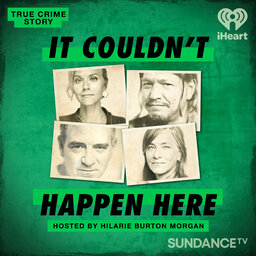Episode 21: The Civil Lawsuit
The Griggs are determined to get whatever justice they can for their son, Christian. With the help of an attorney, Robby Jessup, they file a civil lawsuit against Pat Chisenhall. The team discusses the trial and the verdict.
For more information about this and other cases we've covered, follow @ICHHstories on Instagram.
In 1 playlist(s)
True Crime Story: It Couldn't Happen Here
The tight knit fabric of a small town can be torn apart when a violent crime happens. Join host a…Social links
Follow podcast
Recent clips

Episode 24: Case Updates and a Sneak Peek
38:21

Episode 23: Diving Deeper - Conversations with Christian’s sister Krystle Miller and Scott Poggensee
45:14

Episode 22: The Griggs Fight for Justice
30:39
 True Crime Story: It Couldn't Happen Here
True Crime Story: It Couldn't Happen Here